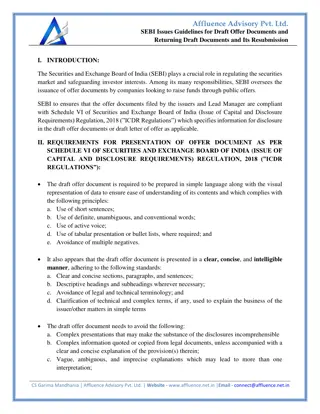Overview of the Securities and Exchange Board of India (SEBI)
The Securities and Exchange Board of India (SEBI) was established in 1992 to regulate and promote the development of the securities market. SEBI aims to protect investor interests, prevent malpractices, and ensure a fair and transparent market. Through its objectives, SEBI plays a crucial role in regulating stock market activities and promoting investor confidence.
Download Presentation

Please find below an Image/Link to download the presentation.
The content on the website is provided AS IS for your information and personal use only. It may not be sold, licensed, or shared on other websites without obtaining consent from the author.If you encounter any issues during the download, it is possible that the publisher has removed the file from their server.
You are allowed to download the files provided on this website for personal or commercial use, subject to the condition that they are used lawfully. All files are the property of their respective owners.
The content on the website is provided AS IS for your information and personal use only. It may not be sold, licensed, or shared on other websites without obtaining consent from the author.
E N D
Presentation Transcript
Security and Exchange Board of India (SEBI)
The Security and Exchange Board of India was established on April 12, 1992 in accordance with the provision of security and exchange Board of India Act, 1992. The Preamble of the security and exchange Board of India describe the basic function of the security and exchange Board of India as "..... to protect the interests of investors in security and to promote the development of, and to regulate the security is market and for matters connected there with or incidental thereto". Security Exchange Board of India (SEBI) was set up in 1988 to regulate the functions of security market. SEBI promotes orderly and healthy development in the stock market but initially SEBI was not able to exercise complete control over the stock market transactions. It was left as a watch dog to observe the activity but was found ineffective in regulating and controlling them. As a result in April 1992, SEBI was granted legal status. SEBI is a body corporate having a separate legal existence and perpetual succession.
Reason for establishment of SEBI With the growth in the dealings of stock markets, lot of malpractices also started in stock markets such as price rigging, unofficial premium on new issue and delay in delivery of shares, violation of rules and regulation of stock exchange and listing requirements. Due to these malpractices the customer started losing confidence and faith in the stock exchange. So Government of India decided to set up an agency or regulatory body known as security exchange Board of India (SEBI)
Purpose and Role of SEBI SEBI was set up with the main purpose of keeping a check on moral practices and protect the interest of investors. It was set up to meet the needs of three groups. 1.Issues: for issues it provides a market place in which they can raise finance fairly and easily. 2. Investors: for investors it provides protection and supply of accurate and correct information. 3. Intermediaries: For intermediaries provides a competitive professional market.
Objectives of SEBI The overall objectives of SEBI are to protect the interest of investors and to promote the development of stock exchange and to regulate the activities of stock market. The objectives of SEBI are: To regulate the activities of stock exchange. 1. To protect the rights of investors and ensuring safety to the investment. 2. To prevent fraudulent and malpractices by having balance between self regulation of business and its statutory regulations. 3. To regulate and develop a code of conduct for intermediate each such as brokers and underwriters etc. 4.























